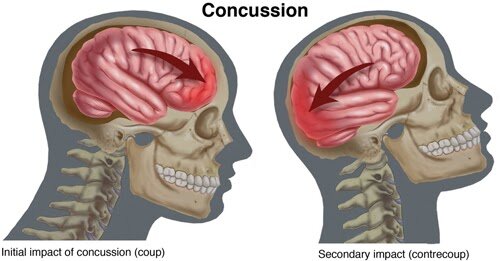Contents
Concussions are traumatic brain injuries (TBIs) that affect between 1.6 and 3.8 million people annually according to the CDC. A concussion can cause physical, cognitive, and behavioral impacts and it’s important to understand the signs, symptoms, and treatment options available if you or a loved one has experienced a head injury.
Hear from Aaron Atwater, Clinical Director of our Dansville location, below.
A concussion occurs when the brain moves rapidly back and forth. This can be caused by a bump, blow, or jolt to the head, whiplash, or a hit to the body. The sudden shaking leads to immediate or delayed changes in the brain’s chemistry and functioning. The injury will vary based on the force of the hit and the area of the brain affected.
The leading cause of a concussion is falling. However, there are many activities that may result in a concussion if you are not careful. Here are a few of the most common.
-
Car accidents
-
Work accidents
-
Falling
-
Skiing
-
Playground accidents
-
Sports injuries (most commonly contact sports like soccer and football)

Recovery from a concussion can take several weeks to several months and sometimes longer depending on the age of the person involved and the severity of the injury.
Signs and Symptoms
There are short term symptoms that occur more immediately and long term symptoms that can show up months or years later after a concussion.
Health care providers have the knowledge and training to identify a concussion.
The most common symptoms include headache, loss of memory, and confusion. Here are some of the other short term symptoms to look for.
-
Dizziness
-
Difficulty with balance and coordination
-
Nausea/vomiting
-
Fatigue
-
Difficulty sleeping
-
Increased sleepiness
-
Double or blurred vision
-
Sensitivity to light and sound
-
Slurred speech
-
Glassy-eyed stare
-
Seizures
-
Slowed “processing” (eg, a decreased ability to think through problems)
-
“Fogginess”
-
Difficulty concentrating
-
Irritability
-
Restlessness
-
Anxiety
-
Depression
-
Mood swings
-
Aggression
-
Decreased tolerance for stress
-
Change in personality or behavior
Longer-term symptoms include the following.
-
Loss of libido
-
Loss of menses/menstruation
-
Fatigue
-
Weight gain
-
Low blood pressure
-
Muscle weakness
-
Chronic headaches or dizziness
-
Muscle spasticity
If you have a history of concussions, you should be extremely cautious to avoid consequential injuries to the brain, as this increases your likelihood of having long term brain damage.
How Is It Diagnosed?
No two concussions are exactly the same. Your physical therapist will ask you many questions to understand all of the symptoms that you are experiencing. A medical health professional can perform tests like muscle strength, coordination, balance, and memory tests to identify problems.
During treatment, your physical therapist will be able to gauge your progress and help judge when you can return to work, school, sports, or recreational activities.
How Can a Physical Therapist Help?
Physical therapists can evaluate and treat many problems related to a concussion. Based on your results, your physical therapist will prescribe an individual routine to address your particular needs in all of your daily environments. Many of our providers are certified specialists in treating a concussion.
Treatment may include the following…
-
Rest and recovery
-
Restoring strength and endurance
-
Stopping dizziness and improving balance
-
Reducing headaches
Can I Prevent a Concussion?
It is difficult to avoid situations altogether or entirely prevent the initial injury, but there are key steps one can take to limit their chances. Additionally, if you have had a concussion, it is critical to prevent further injury and you should be closely protected until all symptoms have cleared. Here are a few precautions to keep in mind.
-
Avoid risky behavior in sports
-
Be aware and acknowledge the signs of a concussion and report them immediately
-
Wear a helmet when recommended
-
Clear your walking areas at home that may increase the risk of falling
Remember to seek medical assistance if you have experienced a recent head injury. Call our office or send us a message if you have any questions or are looking to speak to one of our certified concussion specialists.



